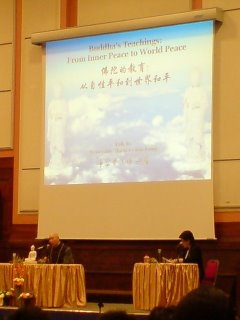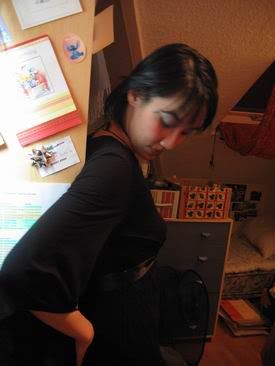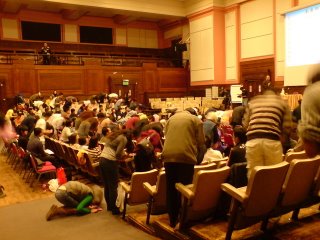I remembered the first time we were helping out at the talk by Rajmohan Gandhi, "Responding to Today's World - the relevance of Gandhian ethics", on 23 November 2005. It was organized by the Initiatives of Change.

Rajmohan spoke about the life of his grandfather, the late Mahatma Gandhi, and shared stories and quotes relevant to today's society. His main theme revolves around "How by God's grace can we create a blending, not a clash of civilisations?"
With Britain just facing the 7/7 bombings that time (this talk was in Nov 2005), Rajmohan looked at this issue in depth and urged Britain to think about its role in the world. He commented that the triumph of terrorists is that fear is so long-lasting. He stressed that terrorism is a terrible problem but it is not the world's only problem. He pleaded to the people to Britain to engage in world's issues more actively - disease, poverty in third-world country, and threats to the encironment, etc.
A part of his speech reveberated in my mind for a long time. "The real clash is not between East and West, Muslim and Christian. It is between faith and fear, rejection and acceptance. Fear is natural; to be guided by fear is not necessary."

The session drew active discussion from the audience. Many young people raised questions with great variety and depth. People were moved when a young muslim spoke out the difficulty that people of her religion faced: fear of terrorism topped up with fear of being the object of suspicion and fear. On the other hand, white people raised the concern of how to communicate with the people behind the veils.
Here is a text of Rajmohan's speech for those who are interested.
It was a mind-provoking session and it set many of us thinking deeply about the world issues today. I scribbled down some thoughts at that time, and while writing the post about Trust and Fear, I remembered his speech about clash between faith and fear, and decided to put up this post again.
=============================================
Fast forward to this year, my second time to Friends House. A nostalgic feeling dawned on me as I re-entered the old building of Friends House. The same old hall, the wooden doors and seats... This time, the organizer and audience were from a different niche of society, but yet the theme and issues still revolves about humanity and peace, "Buddha's Teaching - From Inner Peace to World Peace", by Venerable Master Bikkhu Ching Kung. The talk was jointly organized by Buddhist Education Foundation, Amitabha Buddhist Society, University of London Union Buddhist Association (Yeah! our society!) and Imperieal College Buddhist Society.
A lot of the buddhist believers seemed very excited about the chance to have a look at Master Ching Kung. While we were ushering the crowd to their seats, there were booths outside the hall which give out free-distribution books and CD's. It was a flurry of activities and it was heart-warming to see so many happy faces around coming to learn from the discourse.

Master Ching Kung gave his discourse in Mandarin, and a translator did the translation on the spot. He spoke about the relevance of Buddhist practice in older times to our modern time, and stressed about the importance of "Practice" of buddhism in life, instead of just belief and learning in theory. He drew laughter from the crowd as he recollected his youth during which he used to question about the buddhist practice too, like many other young people.
He spoke about the source of unhappiness and fear in our life - attachment and differentiation, and also suggested methods of overcoming sufferings through the eightfold noble path - right view, right thought, right speech, right action, right livelihood, right effort, right mindfulness and right concentration. He linked the relevance of buddhism teachings to application in today's world to solve the problems. From normal life to world issues, the teachings are relevant.
He also reminded us the importance of cultural ethics/ education that interwines with religion/philosophy. He brought out the example of how Confusianism and the traditional teachings of ethics in ancient China fused with Buddhism which encourage the practice of an ethical life.
He stressed that world peace can only be achieved if we started from inner peace. We tend to look at world problems as external problems, but in reality, most of the problems arise internally. To achieve world peace, we must start from ourselves. He reminded us that each of us have a Buddha within. In many times, our Buddha nature are blinded by our greed, cravings and lots of other distraction in life. It is up to us to reawaken the Buddha within and do good, to create wholesomeness not only in our life, but in the world as a whole.
After his speech, a "Gui-Yi" ceremony was also held. "Gui-Yi" is somewhat similar to the baptism ceremony in christian. The buddhists proclaim taking refugee in the Triple Gems of Buddhism - the Buddha, the Sutra, and the Sangha. Master Ching Kung explained the common misconception of public about "Gui-Yi". Many tend to refer Gui-Yi as a ceremony which we pledge ourselves as disciples of a certain Masters, this is a mistake as we are showing attachment by doing this. The real meaning of Gui-Yi is to pledge ourselves as Buddhism practitioner and apply Buddha's teachings in our life to bring wholesomeness to all. It is a commitment to ourselves according to Buddhist way. The monastic people are just a "witness" to our proclaimation.
I haven't managed to find the text version of his speech. I will put it up here once I get the copy of it. Meanwhile, more information can be found on the Amitabha Buddhist Society website.
Both talks are from different groups of society, yet share so much similarity in the themes, the aims to do good and promote peace in the world. I learned immensely from both lectures, and I believe the audience did too. The core of all religions and philosophy is humanity, and in the crazy world today, humanity is direly needed.


5 comments:
A very enlightening post indeed. YD. Thank you for sharing.
ooh, a hainanese in london
Nice post, YD. Sorry I've delayed commenting.
A friend of mine from high school days recently asked me if I had ever figured out what it was to "be a man".
I answered that I thought that the phrase was purely cultural and varied from place to place. I also said in my opinion it is more important to learn what it is to be a hu-man rather than just a man.
People focus on self centered things, often things that aren't really important even to themselves and do not expend the least bit of effort toward understanding the larger issues that you bring up here.
Thanks yd for the thoughtful post. It's great to go to a place where you can become inspired amid a large group of people.
Trouble is the next day when ordinary life moves on. How to put into practice the right moves, words, decisions.
I wonder sometimes about our masks and foolishness and that maturity hits you when you catch a glimpse of yourself as inadequate and failing to be that image of yourself as okay, confident, smart, loveable, compassionate.
W.
Thanks friends.
I just realized that I haven't posted any reply comments. I thought I had.
Panda, you are correct. Being hu-man is more important, and more universal than being a man, because the yardsticks to judge what IS a man are different for different societies.
Wendy, I've had that feelings too. Well, to err is a human, but i think what is important is that we learn from past mistakes to be a better person.
Post a Comment